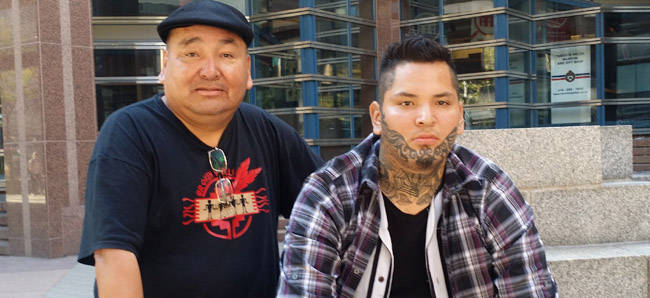Cause of death: Undetermined

By Barb Nahwegahbow
John Fox, a citizen of Wikwemikong Unceded Indian Reserve vows he will not rest until he’s received justice for his daughter Cheyenne. Twenty year-old Cheyenne died in Toronto after a fall from a 24th floor balcony in April 2013. Not satisfied with the police ruling of Cheyenne’s death as suicide, Fox requested a Coroner’s Inquest. This request was denied.
I wasn’t happy with that, Fox said. It seemed like he kept getting blocked from finding out the truth, he said, starting with the police.
Fox asked for help from Aboriginal Legal Services of Toronto (ALST). Senior staff lawyer Emily Hill requested a review of the decision to deny the inquest because of the family’s concern regarding the cause of death. In addition, such a public forum would assist the community to address the issue of Missing and Murdered Women and develop recommendations focused on protecting vulnerable young women.
Hill received a written response dated August 28, 2015 from Dr. Dirk Huyer, the Chief Coroner for Ontario. “They’re not gonna support any kind of inquest,” said Fox of the letter. What Huyer did, however, was change the cause of death from suicide to “undetermined”. To Fox, this represents a victory. Cheyenne’s death will not be on record as a suicide.
“We maintained all along that my daughter didn’t commit suicide. When they came and told us that she committed suicide, I didn’t believe them one bit,” said Fox. “We fought because my daughter wasn’t suicidal during the time that she was with us before she died. The Coroner ruled in our favour now, basically and wrote the cause of death as undetermined,” he said.
He’s not happy there won’t be an inquest that could help stop the killing of Aboriginal women in this country by bringing the crisis to public attention, and, “it would have been helpful for all the First Nations women coming to the city,” Fox said. “There’s human trafficking in these big metropolitan areas,” he said, “and our women get nabbed at the Greyhound station or wherever they get their education or their jobs. They’re targeted.”
In his letter to ALST lawyer, Emily Hill, the Coroner agreed that, “Injustices to Aboriginal people and the tragedy of missing and murdered Aboriginal women are very important issues.” However, an inquest, he said, “is not the appropriate forum to address broader societal issues.” There are government agencies, said Huyer, that are mandated to discuss and seek solutions to challenges facing Aboriginal people.
Hill said she gives the Fox family a lot of credit. “There needs to be mounting public pressure for the death of young Indigenous women to be treated seriously,” she said. “If there isn’t public pressure, Indigenous families, like the Fox’s have to work harder.”
Racism in the Toronto Police Services contributes to the problem of MMIW, according to Fox. “Their attitudes, it’s a huge problem for our people,” he said, “and they need to look at that.”
Fox supports the campaign recently launched by the Chiefs of Ontario to raise funds for an inquiry and to educate the public about the issue of MMIW. “Nobody else is doing anything about it,” he said, “we gotta do it ourselves.”
In September 2014, Fox filed a $14 million lawsuit against the Toronto Police for alleged negligence in the events leading up to his daughter’s death and during their subsequent investigation. “I’m continuing to pursue this,” said Fox, “I want the truth to come out.”

